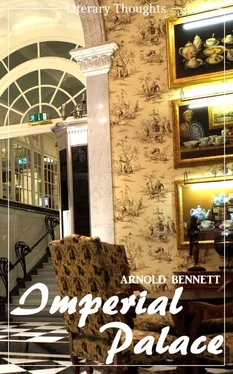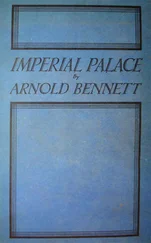Imperial Palace by Arnold Bennett
Literary Thoughts Edition presents
Imperial Palace,
by Arnold Bennett
Transscribed and Published by Jacson Keating (editor)
For more titles of the Literary Thoughts edition, visit our website: www.literarythoughts.com
All rights reserved. No part of this edition may be reproduced, stored in retrieval system, copied in any form or by any means, electronic, mechanical, photocopying, recording or otherwise transmitted without written permission from the publisher. You must not circulate this book in any format. For permission to reproduce any one part of this edition, contact us on our website: www.literarythoughts.com.
This edition is licensed for your personal enjoyment only. It may not be resold or given away to other people. If you would like to share this book with another person, please purchase an additional copy for each recipient. If you’re reading this book and did not purchase it, or it was not purchased for your use only, then please return to Amazon and purchase your own copy of the ISBN edition available below. Thank you for respecting the efforts of this edition.
I
Evelyn came down by the lift into the great front-hall. One of the clocks there showed seven minutes to four; the other showed six minutes to four. He thought: “I should have had time to shave. This punctuality business is getting to be a mania with me.” He smiled sympathetically, forgivingly, at his own weakness, which the smile transformed into a strength. He had bathed; he had drunk tea; he was correctly dressed, in the informal style which was his—lounge-suit, soft collar, soft hat, light walking-stick, no gloves; but he had not shaved. No matter. There are dark men who must shave every twelve hours; their chins are blue. Evelyn was neither dark nor fair; he might let thirty hours pass without a shave, and nobody but an inquisitive observer would notice the negligence.
The great front-hall was well lighted; but the lamps were islands in the vast dusky spaces; at 2 a.m. the chandeliers—sixteen lamps apiece—which hung in the squares of the panelled ceiling ceased to shower down their spendthrift electricity on the rugs and the concrete floor impressively patterned in huge lozenges of black and white. Behind the long counters to the right of the double revolving doors at the main entrance shone the two illuminated signs, “Reception” and “Enquiries,” always at the same strength day and night. The foyer down the steps, back beyond the hall, had one light. The restaurant down the steps beyond the foyer had one light. The reading-room, cut out of the hall by glass partitions, had no light. The grill-room, which gave on a broad corridor opposite the counters, had several lights; in theory it opened for breakfasts at 6 a.m., but in fact it was never closed, nor its kitchen closed.
Reyer, the young night-manager, in stiff shirt and dinner-jacket, was sitting at the Reception counter, his fair, pale, bored, wistful face bent over a little pile of documents. An Englishman of French extraction, he was turning night into day and day into night in order to learn a job and something about human nature. He would lament, mildly, that he never knew what to call his meals; for with him dinner was breakfast and breakfast dinner; as for lunch, he knew it no more. He had been night-manager for nearly a year; and Evelyn had an eye on him, had hopes of him—and he had hopes of Evelyn.
As Evelyn approached the counter Reyer respectfully rose.
“Morning, Reyer.”
“Good morning, Mr. Orcham. You’re up early.”
“Anything on the night-report?” Evelyn asked, ignoring Reyer’s remark.
“Nothing much, sir. A lady left suite 341 at three o’clock.”
“Taxi or car?”
“Walked,” said Reyer the laconic.
“Let me see the book.”
Reyer opened a manuscript volume and pushed it across the counter. Evelyn read, without any comment except “Um!” At 10 a.m. the night-report would be placed before him, typewritten, in his private office. He moved away. Near the revolving doors stood Samuel Butcher (referred to, behind his back, as Long Sam), the head night-porter, and a couple of his janissaries, all in blue and gold.
“Well, Sam,” Evelyn greeted the giant cheerfully.
“Morning, sir,” Sam saluted.
The janissaries, not having been accosted, took care not to see Evelyn.
“I gather you haven’t had to throw anyone out to-night?” Evelyn waved his cane.
“No, sir.” Sam laughed, proud of the directorial attention.
Evelyn pulled out a cigarette. Instantly both the janissaries leapt to different small tables on which were matches. The winner struck a match and held it to Evelyn’s cigarette.
“Thanks,” Evelyn murmured, and, puffing, strolled towards the back of the hall, where he glanced at himself in a mighty square column faced with mirror.
II
No! The nascent beard was completely invisible. Suit correct, stylish. Handkerchief peeping correctly out of the pocket. Necktie—he adjusted the necktie ever so little. Shoes correct—not a crease in them. Well, perhaps the features lacked distinction; the angle of the nose was a bit too acute; the lower lip heavy, somewhat sensual. But what friendly keen brown eyes! What delicate ears! And the chin—how enigmatic! The chin would puzzle any reader of the human countenance. Forty-seven. Did he feel forty-seven? Could he even believe that he was forty-seven? He felt thirty—thirty-one. And the simpleton thought that he looked at most thirty-five. In two and a half years however, he would be fifty. God! What a prospect! Well, he didn’t care one damn how old he was, or looked, so long as he felt. . . . On the whole, quite a presentable creature. But nobody would glance twice at him in the street. Nobody could possibly guess that he was anyone out of the ordinary. A pity, possibly. Yet what is, is, and must be accepted with philosophy. Nevertheless, he was acquainted with idiots, asses, greenhorns and charlatans whose appearance was so distinguished that they could not enter a restaurant without arousing respectful curiosity. Funny world.
The séance at the mirror lasted three seconds—time to adjust the necktie, no more. He moved off. The clock over the counter showed five minutes to four. Clocks had their moods; they raced, they stood still, in discordance with the mood of the beholder, maliciously intent on exasperating him.
Within recent months Evelyn had hung the walls of the great hall with large, old coloured prints of antique, sunk or broken-up Atlantic liners, and underneath each a smaller photograph of a modern vessel. He glanced at an American print of a French liner of the sixties, paddle and sail. He read the quaint legend beneath: “Length 375 feet. Breadth of beam 46. Depth of hold 33. Burthen 3,500 tons. Horse-power, 1,250.” Burthen. Comic! Yet in her time this ship had been a crack. Under the print was a photograph of the “Ile-de-France.” Yes, this idea of his of marine prints in the hall had been extremely successful. It was aimed at American visitors, who constituted sixty per cent. of the clientèle, and it hit them all day and every day. Difficult at certain hours to pass through the great hall without seeing an American gazing entranced at a marine print.
That contrarious clock still showed five minutes to four. Long Sam stood moveless; his janissaries stood moveless; young Reyer sat moveless. The electric lamps burned with the stoical endurance of organisms which have passed beyond time into eternity. The great hall seemed to lie under an enchantment. Its darkened extensions, the foyer and the immeasurable restaurant, seemed to lie under an enchantment. The brighter corridor and grill-room seemed to lie under an enchantment. Diminished men awaited with exhaustless patience the birth of day, as they might have awaited the birth of a child.
Читать дальше












